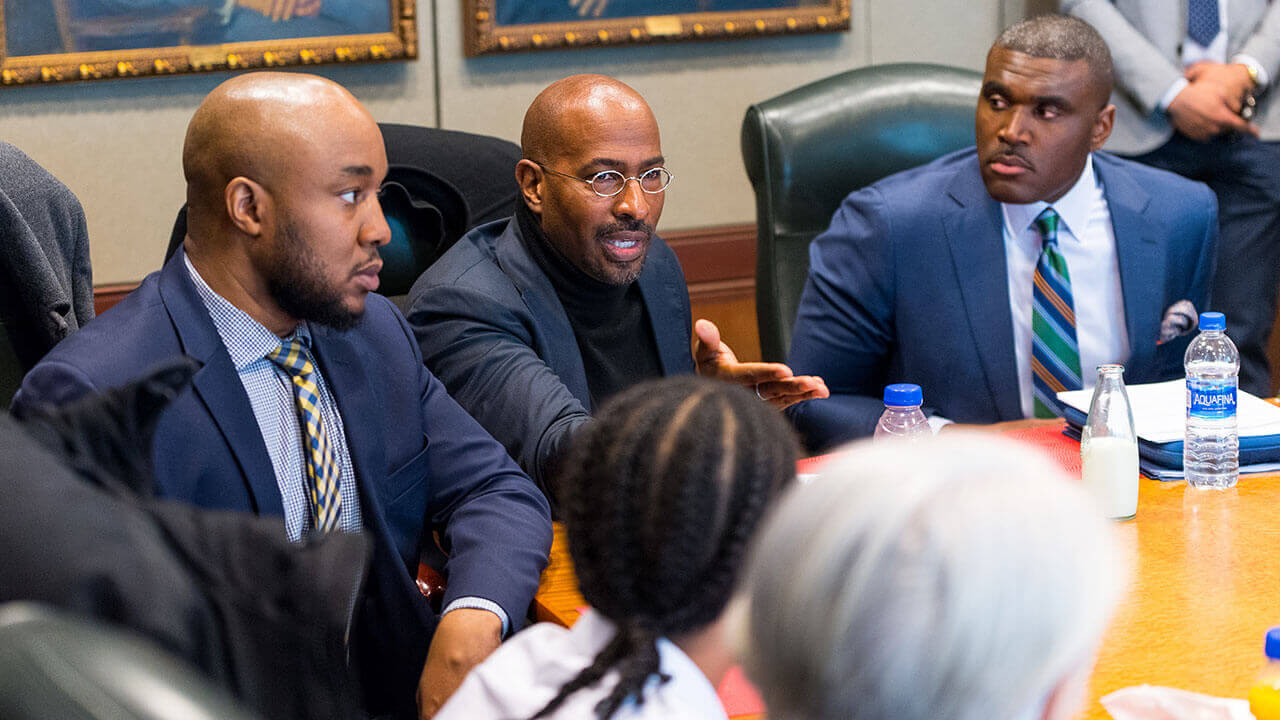
Criminal justice reform needs lifelines, not anvils
March 21, 2019

March 21, 2019

Jones, the CEO of the newly created REFORM Alliance, visited the Mount Carmel Campus recently to address criminal justice reform with Connecticut Gov. Ned Lamont, state and national advocacy groups, and about 20 previously incarcerated individuals.
Associate Vice President of Academic Affairs Don C. Sawyer III, the university’s chief diversity officer, was among those who organized the event. The candid conversation was aligned with the Prison Project at Quinnipiac, an initiative to advance social justice through progressive, humane and empirically based solutions to crime.
“I’m here asking for your help. We want this to be real,” said Jones, who is joined on the board of the REFORM Alliance by hip-hop artists Meek Mill and Jay-Z, and prominent entrepreneurs and business owners.
“When people are trying to turn their lives around,” Jones said, “we should throw them a lifeline, and not an anvil.”
These unfiltered discussions at Quinnipiac yielded critical insight into the 6 million-plus people in the U.S. criminal justice system, from the 2 million behind bars to another 4 million involved in probation and parole.
Several of the previously incarcerated individuals in attendance shared stories about trying to build new lives after being released from prison. But under the weight and stigma of a criminal record, a lack of education and job training, and no access to savings or credit, finding a job and a place to live prove daunting — if not impossible.
“We need laws and we need the general population to understand the plight of people who have been formerly incarcerated and begin to enter society,” Sawyer said. “So if we don’t change the public mindset, it becomes that much more difficult for us to change laws and legislation.”
Jones agreed — and then doubled down on fixing probation and parole.
“You talk about that revolving door back to prison. Well, the hinge on that revolving door is a broken, dysfunctional, hyper-punitive, irrational probation and parole system,” Jones said. “It puts people back in prison for non-crimes.”
Jones said some former inmates have gone back to prison after reporting 10 minutes late for meetings with their parole or probation officers.
Lamont seemed shocked by those accounts and vowed to help change the system in Connecticut.
“Sometimes, we hold folks to a higher standard, an unfair standard — 10 minutes, 20 minutes late — and you’re back, you’re guilty again,” Lamont said. “This is something we’ve got to get right. As governor, if I can do anything in terms of housing, in terms of workplace, in terms of the ministry, in terms of labor and business, that’s going to be a priority for me.”

Sawyer said he’s encouraged by Quinnipiac’s role in helping to address criminal justice reform through the Prison Project and other strategies. He also understands that any solutions must be collaborative, and they must include previously incarcerated individuals at the table.
“One of the reasons why [criminal justice reform] resonates at Quinnipiac is because when we think about the new strategic plan we have under President Judy Olian, one of the things it talks about is using the university and education as a public good,” Sawyer said. “It’s not just a right for the select few.”
Quinnipiac Today is your source for what's happening throughout #BobcatNation. Sign up for our weekly email newsletter to be among the first to know about news, events and members of our Bobcat family who are making a positive difference in our world.
Sign Up Now